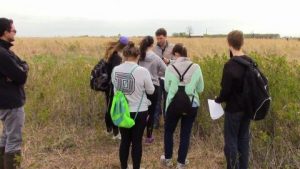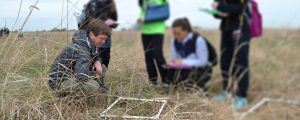Module: Vanishing Prairie
EPIC Module for High School Science Classes related to Climate Change & Ecological Relationships
Major Themes for the Unit
- Scientific themes: Ecological Interactions, Climate Change, Nutrient Cycling, Energy Flow, Biodiversity
- Scientific practice: modeling, argumentation
- SSI: Climate change and its effect on ecosystems
Driving Question: How might climate change affect the complex interactions in local ecosystems?
Concepts needed to explore the driving question
- Science concepts
- Carbon Cycling
- Photosynthesis
- Relationship Between Photosynthesis and Cellular Respiration
- Ecological Interactions
- Energy Flow
- What social ideas and concerns influence negotiation of the issue?
- Economics
- Politics
- Energy Production and Consumption
- Alternative Energy Sources
Unit-level performance expectations
- Use an ecosystem model to make predictions regarding the stability/change of populations within a particular ecosystem in response to climatic changes. Engage in argumentation about the relative stability/change of an ecosystem (NGSS HS-LS2-6).
- Develop and use multiple models, some of which include mathematical representations, to explain the cycling of matter and flow of energy among organisms in an ecosystem (NGSS HS-LS2-2, HS-LS2-4).
- Obtain, evaluate and communicate information about a specific climate change impact. Engage in argumentation regarding appropriate responses to this situation (NGSS HS-LS2-7).
- Develop a qualitative model of the inputs and outputs of photosynthesis that accounts for/predicts impacts of climatic changes (NGSS HS-LS1-5).
- Develop a qualitative model of the inputs and outputs of cellular respiration that accounts for the cycling of matter and transfer of energy (NGSS HS-LS1-7, HS-LS2-5).
- Develop a model to illustrate the role of photosynthesis and cellular respiration in the cycling of carbon among the biosphere, atmosphere, hydrosphere, and geosphere (NGSS HS-LS2-5).
Assessments
- Practice quizzes- two short quizzes throughout the unit
- Models- Photosynthesis and Carbon cycling models produced throughout the unit
- Culminating Project- model and explanation to make sense of the likely impacts of climate change on an organism from another part of the world
- Unit Test- 25 multiple choice and short answer questions
Unit Materials
Designed and developed by Andrew Kinslow, Kerri Graham, Amanda Peel, Patricia Friedrichsen, Troy Sadler, Laura Zangori, Kaitlyn EuDaly, and Hai Nguyen.
Kinslow, A. T., Graham, K., Peel, A., Friedrichsen, P., Sadler, T. D., Zangori, L., EuDaly, K., & Nguyen, H. (2016). Vanishing prairie: Exploring climate change and ecological relationships (Curriculum). Columbia, MO: ReSTEM Institute at the University of Missouri. https://epiclearning.web.unc.edu/module-vanishing-prairie/
Acknowledgments
The materials associated with the Vanishing Prairie Unit are based upon work supported by The Missouri Transect, a National Science Foundation EPSCoR Program, Cooperative Agreement IIA-1355406. Any opinions, findings, and conclusions or recommendations expressed in this material are those of the author(s) and do not necessarily reflect the views of the National Science Foundation.

